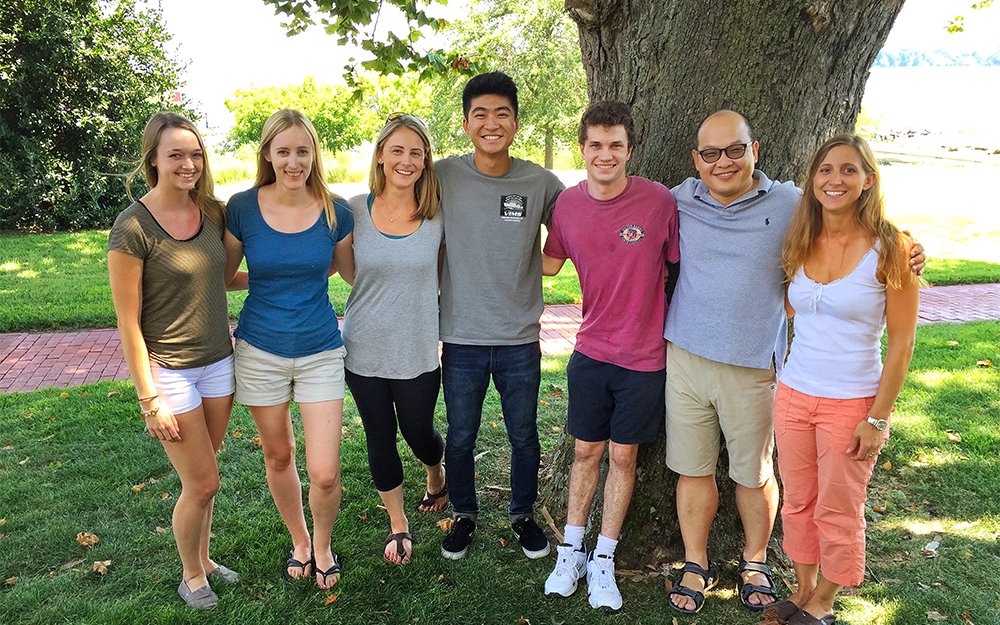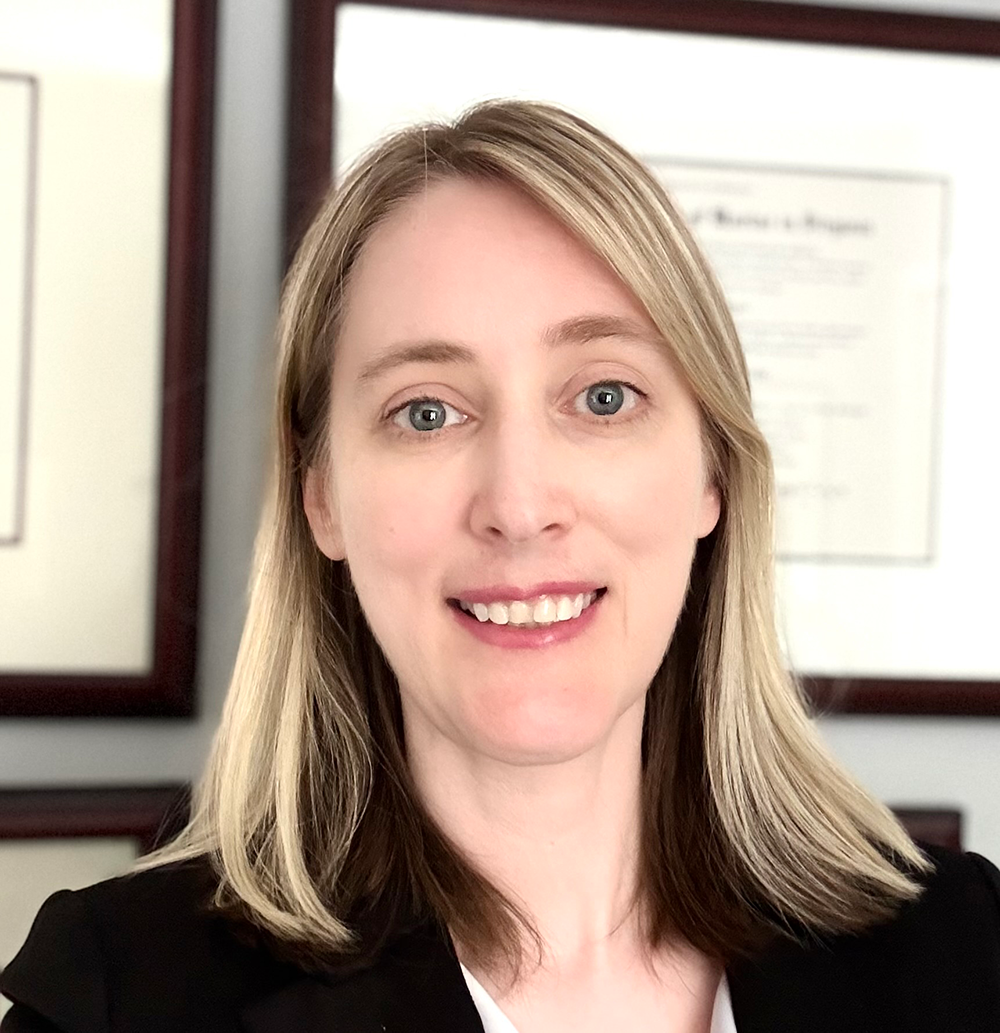Detective work in a constantly evolving environment
Ann Arfken Ph.D. ’18 uses bioinformatic skills refined at W&M's Batten School & VIMS to investigate outbreak origins with the CDC.
 If there’s an outbreak of brain-eating amoebas, it’s good to know there’s a graduate of William & Mary’s Batten School & VIMS on the case. Ann Arfken is a microbiologist and data scientist with the Center for Disease Control (CDC), where she leads an activity team tasked with helping to track down organisms responsible for health risks in the environment. Arfken says that the skills she gained at the Batten School of Coastal & Marine Sciences are “invaluable” to the work she does today.
If there’s an outbreak of brain-eating amoebas, it’s good to know there’s a graduate of William & Mary’s Batten School & VIMS on the case. Ann Arfken is a microbiologist and data scientist with the Center for Disease Control (CDC), where she leads an activity team tasked with helping to track down organisms responsible for health risks in the environment. Arfken says that the skills she gained at the Batten School of Coastal & Marine Sciences are “invaluable” to the work she does today.
“It’s where I learned lab skills for molecular studies and sequencing,” she said. “I started with the original 16S [rRNA gene sequencing used to classify bacteria] microbiome bioinformatics, and I've evolved from there to now doing metagenomics, long-read sequencing and developing new targets for pathogen identification.”
Arfken’s knowledge and skillset are clearly at a highly technical level, traits nurtured during her time at the Batten School & VIMS where she was mentored by a dedicated advisor and supported by collaborative peers. It's worth noting that Arfken is also a former attorney, having earned a J.D. from the Wake Forest University School of Law; an impressive fact she casually mentions as amusing conversational trivia.
With a fascinating background and career, Arfken recently reflected on her graduate school and occupational experiences.
 An idiosyncratic educational journey
An idiosyncratic educational journey
Having majored in zoology as an undergraduate at Miami University, Arfken originally intended to go to veterinary school—until she realized that she passes out at the sight of blood. “So, I took a year off to figure out what I wanted to do,” she said.
“I had family friends who were patent attorneys and I thought, ‘Maybe I can combine science and law.’ I ended up going to law school and was an attorney for a while, but I decided I just couldn’t see myself doing it forever. So, I decided to go back to grad school.”
While researching graduate schools, Arfken connected with Bongkeun “BK” Song, then a professor at UNC Wilmington working on bacterial source tracking. “I thought that sounded really cool,” she said, “so I ended up getting a master’s degree there.”
Both Arfken and Song then made their way to the Batten School & VIMS in 2013, Arken as a Ph.D. student and Song as a faculty member and, fortuitously, Arfken’s advisor. “BK has been a great cheerleader in my life,” Arfken said. “I really appreciate that relationship. And the Ph.D. was a great experience. I love VIMS. I miss VIMS.”
Arfken is especially nostalgic for the graduate student community at the Batten School & VIMS. “We had fisheries, we had physical oceanographers, we had the biological sciences, and there was such a sense of community that you interacted with all the different students and weren't isolated in your own little lab,” she said. “Everyone was willing to help each other out, because we were in the trenches together.”
Supported by Song and her classmates, Arfken's efforts culminated in the academically defining moment of a dissertation defense. However, she said one experience rivals even that for memorability: a regular yoga class led by a professor in the lobby of Watermen’s Hall, “where I always ended up staring at the fish tanks.”
Tracking down microorganisms
Arfken’s doctoral focus was on oyster microbiomes and how they contribute to denitrification, the bacterial conversion of nitrate into nitrogen gas which removes nitrogen from the ecosystem. She honed her analytical skills studying different bacteria affecting the nitrogen cycle and specifically the role of two different nitrous oxide reductase genes, as well as microbiome changes in larval oysters.
After graduating, Arfken’s first post-doctoral position was with the U.S. Department of Agriculture, doing familiar microbiome and molecular work. She then had a second post-doc at the CDC sequencing data on salmonella in environmental water. Following a brief contracting position, she accepted the full-time equivalent role she currently holds at the CDC as an activity lead directing advanced molecular detection.
Explaining the responsibilities of her office, Arfken says, “Let’s say there's an outbreak and people are getting sick; we’re trying to figure out where it originated, if it’s an environmental exposure, and the organism responsible. Those are the kinds of things we are investigating: can our lab find the guys responsible for this outbreak? It’s total detective work; I love it.”
Their analysis centers around bioinformatics, which she describes as “the dry-lab part of your job where you use tools to conduct statistical and other analysis, doing coding and annotations about raw data you’ve sequenced, all downstream from collecting a sample.”
While the lab has largely focused on a variety of enteric bacteria and Cyclospora, Arfken says that her work in that area has been on hold while they focus on amoeba-induced outbreaks, which includes working with Acanthamoeba and the brain-eating amoebas that occasionally cause a sensation in the news.
“I take over when it comes to doing the sequencing," she said. "Those cases are very difficult to differentiate, so I'm working on genomic analysis of a gene that might improve the identification and then link amoebas to cases of exposure in a specific place.”
As an activity lead, Arfken manages two other CDC scientists, one lab worker and one bioinformatician. “So, I spend probably 35% of my time doing lab work, another 35% doing bioinformatics, and then the rest of the time I'm planning experiments, reading literature, trying to figure out how to move our research forward. It's a constantly evolving workplace, and I think it is the ideal environment for me.”
Motivating current marine science students
Flexibility and endurance are the two qualities she recognizes as necessary for current and prospective students at the Batten School & VIMS. “Be willing to be adaptable and try new things,” Arfken said. “This is the time to gain new skills, improve your skills, narrow and figure out what you want to do.”
She also emphasized that all the effort required in graduate school is both manageable and beneficial. “Everything's going to be okay,” Arken said with a laugh. “There's going to be good times and there's going to be some hard times and maybe even some tears, but if it is what you want to do, you will persevere and find a way through it. I think it's totally worth it.”
As for those who might be worried about brain-eating amoebas after learning about her professional work, Arfken had a final word of comfort, “Don’t worry; infections are very rare!”
This alumni profile was published in June, 2025.

